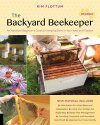![The Backyard Beekeeper The Backyard Beekeeper]()
Click to have a closer look
About this book
Biography
Related titles
About this book
The Backyard Beekeeper, now in its 4th edition, makes the time-honoured and complex tradition of beekeeping an enjoyable and accessible backyard pastime that will appeal to urban and rural beekeepers of all skill levels. More than a guide to beekeeping, The Backyard Beekeeper features expert advice for:
– Setting up and caring for your own colonies
– The best location to place your new bee colonies for their safety and yours
– The most practical and nontoxic ways to care for your bees
– Swarm control
– Using top bar hives
– Harvesting the products of a beehive and collecting and using honey
– Bee problems and treatments
New to the 4th edition:
– Information for Urban Bees and Beekeepers
– Using Your Smoker the Right Way
– Better Pest Management
– Providing Consistent and Abundant Good Food
– Keeping Your Hives Healthy
With this complete resource and the expert advice of Bee Culture editor Kim Flottum, your bees will be healthy, happy, and more productive.
Customer Reviews
Biography
Kim Flottum brings a background of more than a decade of plant science, honey bee research, and basic farming to his thirty years as the editor of Bee Culture magazine where his main occupation is finding the answers to the multitude of questions that beginning, intermediate, and even advanced and experienced beekeepers bring to the table. He teaches beginning and advanced beekeeping courses, travels extensively to educate and lecture, and contributes to a variety of other publications on the basics of honey bees and beekeeping biology, the business of bees and pollination, producing and using varietal honeys, and a host of other subjects. His books, magazine articles, interviews, and blogs are widely read for both their fundamental and advanced contribution to beekeeping knowledge. His magazine platform gives voice to his social commentary on topics ranging from genetically modified foods to pesticide abuse to both good and bad government regulations in the industry. He is beekeeping's leading advocate for fundamental honey bee safety including insuring excellent honey bee health, providing extraordinary forage, and minimizing the use of agricultural pesticides.















![Handbuch Integriertes Schädlingsmanagement in Museen, Archiven und Historischen Gebäuden [Handbook of Integrated Pest Management in Museums, Archives and Historic Houses]](http://mediacdn.nhbs.com/jackets/jackets_resizer_medium/26/265856.jpg?height=150&width=98)













